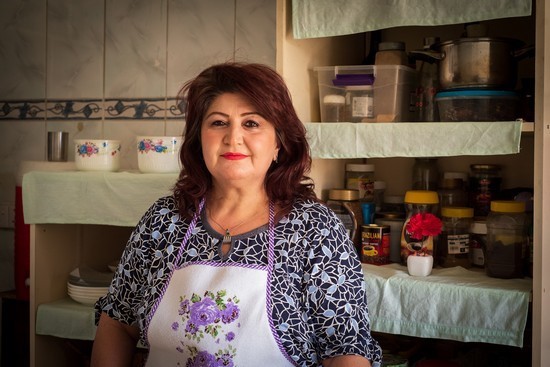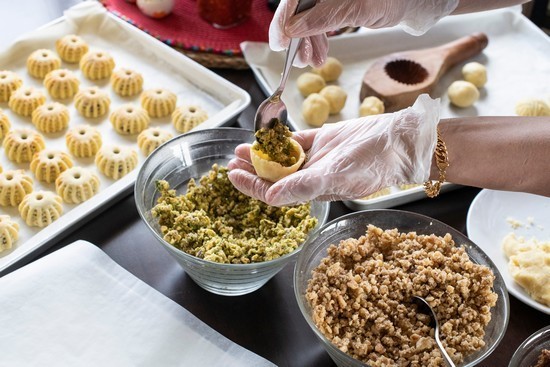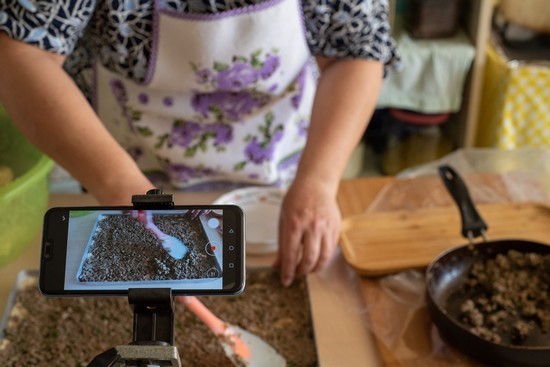Cooking online, Arab women find income and community
New York Times
last updated: Sep 07,2022

When Heba Abo Elkheir was a little girl,
she dreamed of becoming a lawyer, maybe even a judge. After earning a
bachelor’s degree in law in her native Egypt, she married and soon found
herself a mother of two.اضافة اعلان
“Then everything stopped,” she said. “I didn’t want to just sit at home, but it was also difficult to continue my studies or go out and work in law.”
On the advice of her husband, Abo Elkheir, 31, started a YouTube cooking channel in early 2019, showcasing her home cooking in simple videos. It was neither novelty nor innovation that made her recipes popular — Egyptian classics like basbousa and macarona bil béchamel are her most popular, with more than 6 million views each — but reliability and simplicity.
In less than three years, she has amassed more than 3 million subscribers, becoming not only an earner on par with her husband, but also one of the top three women to lead food channels on YouTube across the MENA region.

Muna Al-Amsha, who fled the Syrian civil war in 2016 with her husband and five children and settled in Iraqi Kurdistan, at home in Iraq.
The kitchen, historically the symbolic heart of domesticity in the Arab world, has often kept women tethered to household responsibility, and out of the workforce. Only about 25 percent of women in the Middle East participate in the labor force — the lowest such figure in the world, even as female university graduates in the region often outnumber their male counterparts.
But the rise of social media platforms, YouTube in particular, is changing the power dynamic for Arab women, allowing them to turn the kitchen into a source of income and influence.
“If you asked me two years ago, I would have said I want to go back to law,” Abo Elkheir said. “But now, no, I want to go abroad and become a certified chef. I just find so much meaning in this work.”
Farther west, in the coastal city of Nador in Morocco, Karima Boukar started her YouTube channel in 2015. Users flocked to her dessert videos, which she described as simple but, more important, economical. Her most popular video, with more than 16 million views, is a three-ingredient coconut macaroon-inspired dessert, followed closely by a chocoflan and a cold-brew pudding. In six months, she accumulated more than 100,000 subscribers. Today she has more than 4 million.
When Boukar, 35, learned in 2016 that her firstborn son had autism, she considered shuttering her channel to dedicate her time to him, but soon realized that his medical care would be costly.
“I continued this channel to make income and help my son. And now he is — alhamdulillah — doing very, very well,” she said, using a phrase that means “praise be to Allah.” Her videos average 400,000 views, earning her a monthly income in the low thousands of U.S. dollars, a figure on par with Morocco’s annual gross domestic product per capita.
“You know, I used to hear that people made money off YouTube, but I never thought I would be one of those people,” said Ola Tashman, whose cooking channel has more than 2.5 million subscribers.
A native Jordanian, Tashman, 38, started her YouTube channel in 2018 while living in Saudi Arabia with her husband. She is an accountant by training, but she was not allowed to work there because she was not a Saudi citizen. (She has since moved back to Jordan.)
Tashman started posting cooking videos to deal with the frustration of having her professional ambitions stymied, and to recreate the meals she missed from home, like ma’amoul (Eid cookies) and her mother’s shushbarak (a lamb dumpling cooked in yogurt sauce).
“I never expected to grow my audience this much,” she said. But when she realized there was a profit to be made, she doubled down on her efforts, investing in better cameras, and quickly saw her audience grow.

Ola Tashman prepares maamoul with three different fillings at home in Al-Husun, Jordan.
For most of these women, cooking was already a hobby or something they did for their families, even as their reasons differed for taking it online. For all, though, seeing an activity traditionally cast as feminine taken seriously and respected by those around them has been thrilling. And realizing that their work can turn a profit has allowed the women to win financial independence, respect, and a sense of meaning.
“Financial freedom is beautiful,” Tashman said. “My whole personality changed. I feel bigger in front of myself.”
Even her children no longer complain when she’s late getting dinner on the table. “My husband is also very supportive, because to succeed, a house cannot lean on one side. And now we are truly equal partners.”
Muna Al-Amsha, who fled the Syrian civil war in 2016 with her husband and five children and settled in Iraqi Kurdistan, also reaped some of these benefits. As refugees, both she and her husband struggled to find work. At a friend’s suggestion, she started posting videos of traditional Syrian recipes, from numerous varieties of kibbeh to countless mezze.
“It took me about a year to start earning good income, but eventually, I was making several hundred dollars a month,” Amsha said. “For several years we relied exclusively on my income.”
Financial security, while fundamental, is just one reward these women enjoy. They also feel a sense of contribution to a wider community.
Indeed, community members build connections and a sense of affinity with these content creators, even without ever seeing them.
“Many times, people don’t even log in for the recipes,” said Abo Elkheir, the popular vlogger from Egypt, who does not show her face in her videos. “They just want to unwind and relax, and they’ll tell me they watch my videos because they like to listen to my voice and what I say.”
For Tashman, requests regularly come in for popular or viral recipes. “When I tell my followers it’s all over YouTube, they insist, ‘But we want it from you, your way.’ ”
Who exactly are these loyal viewers? According to Google data, millennials are YouTube’s biggest audience in the MENA region, with a watch time second only to millennials in the US For these online cooks in particular, women accounted for about three-quarters of the subscriber base.

Muna Al-Amsha films herself preparing kubbeh bil-suniyeh, featuring spiced beef, bulgar and pine nuts, at home in Iraq.
This large and loyal base has helped these content creators remain somewhat immune to the notorious, incessant algorithm changes by social media platforms. But the increasingly crowded space has still been a challenge for many of them to navigate.
“It’s not like before, where I would have 50,000 additional subscribers in one day,” Boukar said. “The views have also subsided. But my income has not been affected because I have collaborations with food-product companies. That’s actually my bigger source of income.”
But regardless of income and views, these women have forged meaningful connections with other Arab women across the world.
Abo Elkheir said the messages she receives from followers often bring tears to her eyes.
“When someone tells me that my recipes work, that they enjoyed them, it’s like I am not just making things for myself, I am actually reaching people and helping them,” she said. “It makes me feel my presence in life has value, that I am doing something important.”
Read more Technology
Jordan News
“Then everything stopped,” she said. “I didn’t want to just sit at home, but it was also difficult to continue my studies or go out and work in law.”
On the advice of her husband, Abo Elkheir, 31, started a YouTube cooking channel in early 2019, showcasing her home cooking in simple videos. It was neither novelty nor innovation that made her recipes popular — Egyptian classics like basbousa and macarona bil béchamel are her most popular, with more than 6 million views each — but reliability and simplicity.
In less than three years, she has amassed more than 3 million subscribers, becoming not only an earner on par with her husband, but also one of the top three women to lead food channels on YouTube across the MENA region.

Muna Al-Amsha, who fled the Syrian civil war in 2016 with her husband and five children and settled in Iraqi Kurdistan, at home in Iraq.
The kitchen, historically the symbolic heart of domesticity in the Arab world, has often kept women tethered to household responsibility, and out of the workforce. Only about 25 percent of women in the Middle East participate in the labor force — the lowest such figure in the world, even as female university graduates in the region often outnumber their male counterparts.
But the rise of social media platforms, YouTube in particular, is changing the power dynamic for Arab women, allowing them to turn the kitchen into a source of income and influence.
“If you asked me two years ago, I would have said I want to go back to law,” Abo Elkheir said. “But now, no, I want to go abroad and become a certified chef. I just find so much meaning in this work.”
Farther west, in the coastal city of Nador in Morocco, Karima Boukar started her YouTube channel in 2015. Users flocked to her dessert videos, which she described as simple but, more important, economical. Her most popular video, with more than 16 million views, is a three-ingredient coconut macaroon-inspired dessert, followed closely by a chocoflan and a cold-brew pudding. In six months, she accumulated more than 100,000 subscribers. Today she has more than 4 million.
When Boukar, 35, learned in 2016 that her firstborn son had autism, she considered shuttering her channel to dedicate her time to him, but soon realized that his medical care would be costly.
“I continued this channel to make income and help my son. And now he is — alhamdulillah — doing very, very well,” she said, using a phrase that means “praise be to Allah.” Her videos average 400,000 views, earning her a monthly income in the low thousands of U.S. dollars, a figure on par with Morocco’s annual gross domestic product per capita.
... The rise of social media platforms, YouTube in particular, is changing the power dynamic for Arab women, allowing them to turn the kitchen into a source of income and influence.Food is one of the top four categories on YouTube in the MENA region, a spokesperson for the company said. (The other three are lifestyle, music, and more recently, gaming.) In the past five years, the number of female-led channels in the region with more than 1 million subscribers has grown 30-fold, to 150 channels today.
“You know, I used to hear that people made money off YouTube, but I never thought I would be one of those people,” said Ola Tashman, whose cooking channel has more than 2.5 million subscribers.
A native Jordanian, Tashman, 38, started her YouTube channel in 2018 while living in Saudi Arabia with her husband. She is an accountant by training, but she was not allowed to work there because she was not a Saudi citizen. (She has since moved back to Jordan.)
Tashman started posting cooking videos to deal with the frustration of having her professional ambitions stymied, and to recreate the meals she missed from home, like ma’amoul (Eid cookies) and her mother’s shushbarak (a lamb dumpling cooked in yogurt sauce).
“I never expected to grow my audience this much,” she said. But when she realized there was a profit to be made, she doubled down on her efforts, investing in better cameras, and quickly saw her audience grow.

Ola Tashman prepares maamoul with three different fillings at home in Al-Husun, Jordan.
For most of these women, cooking was already a hobby or something they did for their families, even as their reasons differed for taking it online. For all, though, seeing an activity traditionally cast as feminine taken seriously and respected by those around them has been thrilling. And realizing that their work can turn a profit has allowed the women to win financial independence, respect, and a sense of meaning.
“Financial freedom is beautiful,” Tashman said. “My whole personality changed. I feel bigger in front of myself.”
Even her children no longer complain when she’s late getting dinner on the table. “My husband is also very supportive, because to succeed, a house cannot lean on one side. And now we are truly equal partners.”
Muna Al-Amsha, who fled the Syrian civil war in 2016 with her husband and five children and settled in Iraqi Kurdistan, also reaped some of these benefits. As refugees, both she and her husband struggled to find work. At a friend’s suggestion, she started posting videos of traditional Syrian recipes, from numerous varieties of kibbeh to countless mezze.
“It took me about a year to start earning good income, but eventually, I was making several hundred dollars a month,” Amsha said. “For several years we relied exclusively on my income.”
Financial security, while fundamental, is just one reward these women enjoy. They also feel a sense of contribution to a wider community.Creators’ per-view income, a function of what advertisers pay YouTube, varies by geography. Because many of Al-Amsha’s early subscribers were from Syria, their views did not earn her as much as they would if they were based in other locations. But the refugee exodus that sent many Syrians across the globe has allowed her an income now that is sufficient to cover her family’s rent and expenses.
Financial security, while fundamental, is just one reward these women enjoy. They also feel a sense of contribution to a wider community.
Indeed, community members build connections and a sense of affinity with these content creators, even without ever seeing them.
“Many times, people don’t even log in for the recipes,” said Abo Elkheir, the popular vlogger from Egypt, who does not show her face in her videos. “They just want to unwind and relax, and they’ll tell me they watch my videos because they like to listen to my voice and what I say.”
For Tashman, requests regularly come in for popular or viral recipes. “When I tell my followers it’s all over YouTube, they insist, ‘But we want it from you, your way.’ ”
Who exactly are these loyal viewers? According to Google data, millennials are YouTube’s biggest audience in the MENA region, with a watch time second only to millennials in the US For these online cooks in particular, women accounted for about three-quarters of the subscriber base.

Muna Al-Amsha films herself preparing kubbeh bil-suniyeh, featuring spiced beef, bulgar and pine nuts, at home in Iraq.
This large and loyal base has helped these content creators remain somewhat immune to the notorious, incessant algorithm changes by social media platforms. But the increasingly crowded space has still been a challenge for many of them to navigate.
“It’s not like before, where I would have 50,000 additional subscribers in one day,” Boukar said. “The views have also subsided. But my income has not been affected because I have collaborations with food-product companies. That’s actually my bigger source of income.”
But regardless of income and views, these women have forged meaningful connections with other Arab women across the world.
Abo Elkheir said the messages she receives from followers often bring tears to her eyes.
“When someone tells me that my recipes work, that they enjoyed them, it’s like I am not just making things for myself, I am actually reaching people and helping them,” she said. “It makes me feel my presence in life has value, that I am doing something important.”
Read more Technology
Jordan News

